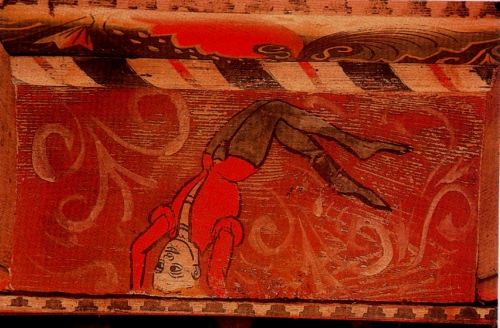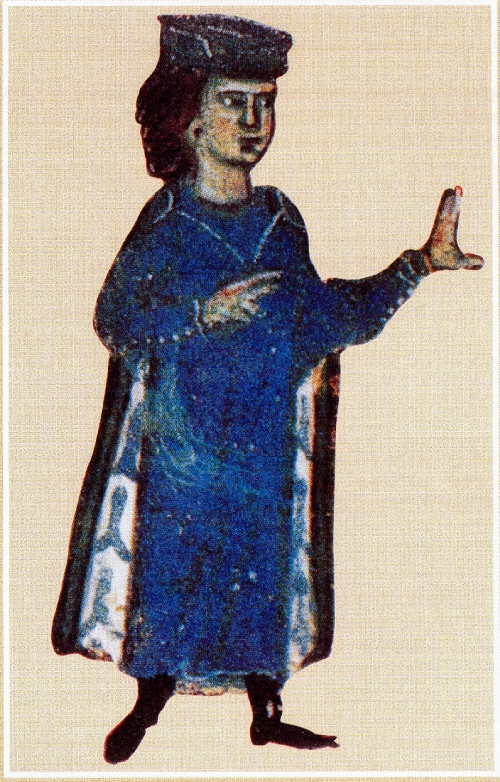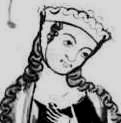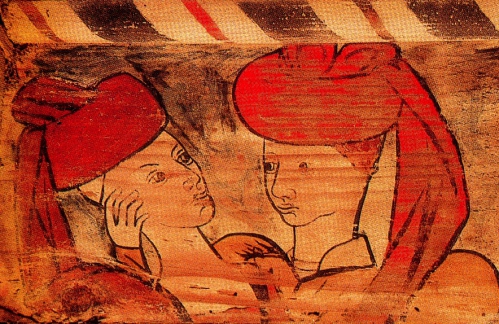Troubadours at Court
Please note - no attempt has been made at poetic translations. The translations are merely to give you the sense of what was said. They are in Italics. An acrobat. From the château at Capestang
An acrobat. From the château at Capestang
The troubadours had a fascination for individual experience, for the search for a new and meaningful inner emotional life, for the nuances of love. This influenced European Literature to the present day.
When did they begin? In Carolingian times in Languedoc. There were bands of “players” that would play music, sing, juggle, dance and tumble as acrobats. Sometimes pedlars travelled with them. They would go from draughty castle to draughty castle to entertain the lords and ladies but also the ordinary people, castle workers and servants.
In those days the great hall of the castle was where all the world lived and sat down to meals, so the travelling troubadours and peddlers were welcome to join in the feasting if they would “sing for their supper.” Their music might have come from India by way of Spain and Carcassonne, or might be old songs from the region, folk-tales and ghost stories. They learnt them off by heart and didn’t write them down.
When entertaining, the troubadours worked together, singing or speaking dialogues where one questioned or answered the other one about their amorous adventures. (This literary device still exists in Occitan music today.) Sometimes these games were spontaneous and witty, other times competitions were held for the funniest retort.
Among the entertainers there was equality (though not in general society) and women too were troubadours, which would have added an extra dimension to this wit and comedy playing.
The aristocracy might or might not be seated amongst the diners; they had apartments upstairs. One can imagine them graciously descending just to eat, and then retiring upstairs for smaller, more private parties. There, the ladies and gentlemen would play, sing, dance and recite for themselves. Often they were educated and so wrote and composed both songs and music. Suddenly it became a gentleman’s artistic and literary game, although some of their songs became popular for the people.
The first Occitan troubadour ever known was Guilhem IX, 7th Count of Poitou and 9th Duke of Aquitaine. He was born in 1071 and at the age of 16 inherited one third of France. He went travelling and got married in Spain. He followed the Crusades. He was a man of great charm, said to be bold, brave, gay and witty, but he behaved scandalously, upsetting in particular the Church. People loved him. He was not serious - yet he was seriously educated and studied music and poetry wherever he went.

Eleven of his poems still exist, and some were frankly naughty;
Here’s the law of pussy and how it goes, I speak as through it I suffer many woes. Other things, taken from grow less. Not with this - it grows. And those who don’t believe me or agree, come to a park by the woodlands. There we’ll see; for every tree cut down there grows up two or three.
He too suffered from love; when a lady looked him in the eyes during a game of dice, he could not throw them accurately. The lady said to him; “Too small your dice my Lord, it’s plain, I challenge you to start again.”
This metaphorical and witty writing can be difficult to follow sometimes, because we are not in the same social or historical cadre as they were; were they really that down-to-earth?
The French academic world has asked itself if this form of poetry and music was Guilhem’s invention. They think he was influenced by the Muslims of Cordoba, principally Ibn Quzman (1092 - 1159) a contemporary of Guilhem. In the 12th century this Islam/Christian osmosis was common and the communication between the two poets was probably two-way. Did not the future Duke of Aquitaine grow up in an Arab harem where his father was taken by Barbastre? asks my French book of troubadours. And modern French Occitan associations have traced the Arab influence in the music.
Latin "dragged down the lightness of touch of this literature," and so Guilhem chose the living language of his court; Occitan, not Latin. Thus Guilham had made churchmen more like the laity. For this infidelity to Latin he was ex-communicated three times by the Church. His final scandal was to install “Madame Dangerous”, the vicountess of Châtellerault at his court; in 1121, five years before he died, he married his son also called Guilhem, who would succeed him, to the daughter of his illustrious mistress.
It is said that Guilhem was the first to invent the concept of romantic love in his songs.
The troubadours that followed Guilhem after he died in 1126 wrote about political or religious issues (Catharism was rising then) but mostly about love. Scholars are often divided, in spite of some “earthy” troubadour writing, as to whether romantic love meant admiration from afar, especially if the lovers were separated by class. The word “love” was also used in the sense of allegiance for example; “you know I will love you forever” the servants were supposed to say, and sometimes such a vow appeared on a legal document. The kiss of love was the kiss of ritual and allegiance, like kissing a sword or the Pope’s ring.
Yet it must have been that, in the days when both men and women were in arranged marriages, that love affairs began among this élite group. No one thought of arranged marriages as disgusting; that was just how it was. Daughters were thought of as something to seal a future alliance, some did not even have their dates of birth recorded, nor were given names. Some women from the great families only became known when they were married off to strengthen an alliance.
That’s how it was done, and one did one’s duty. But love? It was always a good idea to choose a lover of similar looks to your husband, especially if the former had not yet got you pregnant. When inheritance is through the male, one can never be sure of genetic descent.
And one does not, as Guilhem did, shake and tremble before your mistress, nor adore her skin whiter than ivory, nor “die” before her presence in the bedroom.
Like today’s stars in the entertainment world, the aristocracy sometimes adopted a favourite troubadour. Marcabru was such a one; certainly of humble origin, at one time a priest for the social advancement of it, he was so admired by his poetic talent, he was elected the official poet of Guilhem X of Poitiers, the son of Guilhem IX, and played at the courts of Portugal, Barcelona and Castille. In all these European courts however, his priestly instinct rebelled against the newly modern idea of courtly love. Marcabru was labelled “morality and faith.” Between 1130 and 1140, he made popular songs called “Pastourelles” about ordinary people and country life.
Bernard de Ventadorn, at one time a close friend (the French word companion implies he could have been more than that) of Guilhem IX, reached the peak of his career between 1150 and 1170. He was at one time at the court of Eleanor of Aquitaine, first the Queen of France and then the Queen of England - her son was Richard the Lionheart.
Modern critics say Bernard de Ventadorn was the greatest poet of love of all time. His best known song is the Circle of Time. It begins; (my translation) Time comes and goes and turns across the days, month and years but me, alas! I know only to say, for always the same thing is my desire, always the same, without ever changing, for I desire there and only there, that which I can never enjoy. And he ends; I would not wish another love. Sweet to be well-taught, that which you have made so beautiful gives me this joy for which I wait.
There are some who say he was in love with Eleanor herself . . .
In January 1153, Eleanor’s husband, the Henry of England, went to settle a dispute with Stephen, leaving Eleanor, who by March found herself pregnant, alone in Normandy. Bernard de Ventadour presented himself; we know this from a biography about him written about a hundred years later. Bernard was good-looking with a fine singing voice but was the son of a kitchen maid. The Viscount of Ventadour came from a family who were patrons of troubadours and so he tutored the boy in poetry and composition. However, Bernard then tried to seduce his Lord’s wife, Alaiz; he was thrown out and the poor lady was locked up and their marriage was anulled. (That sounds strange to me; they couldn’t annul a consummated marriage and it was by no means proved that Bernard had seduced her.) And so he went to Eleanor’s court, for she too was young and handsome. And he was welcomed, his songs pleased Eleanor greatly. They were together for a long time, until Henry came back and he composed many excellent songs for her and to her.
Bernard’s songs reflected this. When the sweet breeze blow hither from your dwelling, Methinks I feel the breath of Paradise. He called Eleanor his comfort, his magnet, he thought she was loyal and faithful and the embodiment of charm. You have been the first of my joys and will be so until the breathe dies in me. Everything he wrote, he wrote for Eleanor - sometimes privately to her. I am not one to scorn the boon that God granted me, she said in accents clear before I did depart; “Your songs please me well.” I would each Christian soul should know my rapture then, for all I write and sing is meant for her delight. He also wrote; Now I think that I shall die of the desire that comes upon me if the fair one, there where she lies, does not welcome me next to her to caress and kiss her and press to me her white body, plumb and smooth. Good lady, show mercy to your true lover, for a pledge you in good faith that never did I so love anyone.
It was normal for troubadours to speak of a high-born lady in this way, she enjoyed it, these games were a welcome diversion, and Eleanor, before Henry, was known to have had at least two lovers, including Henry’s father and the Saracen, Saladin. But Henry invited Bernard to England, and Bernard could not refuse. He was so miserable at Henry’s Court that he begged leave to go. Permission was refused, and he went anyway, back to Eleanor in Normandy.
When Henry returned Eleanor’s son was eight months old, and she was soon pregnant again. Then Stephen in England died and Henry was king - they had to go at once. Henry then dismissed Bernard and sent him to Count Raymond of Toulouse where Bernard remained until his death. Bernard threatened to take holy orders; but very sensibly he found another patroness. He sent a final song to Eleanor which was ignored. He wrote of her “fair distain.” She had been merely amusing herself while her husband was away and there are shades of a class war in this.
Click here to hear his love-song to Eleanor.
Around 1160 to 1170 Lady troubadours began appearing, educated ladies who also sang and wrote poems or set them to music. Azalaïs from Portaraigne, near Béziers, was known to have had two or three lovers and her songs returned to erotic themes, which all affirmed however, that “women had higher moral qualities than men did.” Maybe they were about love just from the woman’s point of view. And she dedicated a poem to Ermengarde of Narbonne. She is listed among five troubadours who went to the court of Ermengarde of Narbonne, the others being Bernard de Ventadour (oh yes?), Peire d’Alvernhe, Giraud de Bornelh and Peire Rogier.
It’s possible Azalaïs’s friend the Countess of Dia also went to Ermengarde’s court. (Dia is a tiny principality in the Provençal Alps.) She wrote, apparently to an unworthy lover; I must sing of what I’d rather not, I’m so angry about him whose friend I am, for I love him more than anything. Mercy and courtliness don’t help me with him, nor does my beauty or my rank or my mind, for I am every bit as betrayed and wronged as I’d deserve to be if I were ungracious.
The name Peire Rogier gave to Eleanor in this song was “My lady you are wrong - Tort n’avetz” was later used by the others; it was known to always refer to her. To my Tort-navetz in Narbonne I send greetings, though she is far away, and may she know that I’ll soon see her if great matters don’t keep me away. May the Lord who made all that is keep her body as he does, that she maintain worth and true joy when all others abandon it. I will never fail to make a good verse when I sing of my lady; for how can I say ill of her? Not even a churl is so badly taught that, if he speaks with her a word or two, he will not become courtly; so understand this truth: whatever I say well, I owe to her.
Peire Rogier from Auvergne was so well known a contemporary biography was written about him. He was a noble man, handsome and charming, well-versed in letters; he had a natural wit and was good at composing and singing verses. He left his cathedral and became a minstrel going from court to court. Everywhere his songs were praised. One day he came to Narbonne, to the court of Lady Ermengarde, who was known as a woman of great worth and merit. She welcomed him warmly and showed him great favour. He fell in love with her and composed songs about hr and she welcomed them. He called her; “You are wrong.” For a long time he remained at her court. And the people of the region believed that he received the pleasures of love from her, for which they blamed her. And so, for fear of what people were saying, she asked him to leave. Sad and downcast he departed and went to the court of Raymond of Orange.
Pèire Vidal was a middle-class business man from Toulouse. He stayed at various courts, including Montpellier, then belonging to Castile, and between times he went to the chateau of Carassonne and sang songs there to Louve de Pennautier. Legend says he married a Greek lady in Cyprus, but he returned to Marseille and Italy. In 1198 he accompanied Constance, the sister of the King of Aragon, when she married the king of Hungary. He wanted to be a sort of conscience, for some reason, of the fashionable world and the political world. He wrote a love-song to “The Lady of Provence” - in Marseille? - in 1185. If I know to say or do that which is, only she is thanked, for the knowledge that she gave me and the recognition that makes me gay and makes me sing. All that I know about being agreeable comes from her beautiful body pleasant, and indeed, that which I think my-self. But the scholars say he was writing in praise of Provence, which was on the point of becoming Spanish . . . Politics, politics!
Betrand de Born, born around 1140, was one of the most brilliant men of his time and a courageous knight in conflict. In his poetry he refined the concept of courtly love. In 1181 he supported Raymond V of Toulouse and later became a personal friend of Richard the Lionheart. His most well-known song was anti-war; he found the pastoral joys of springtime much better. He judged the knights-at-arms severely, as though he had the Christian concept of knighthood and honour, a concept that was taking shape at the same time in the Holy Grail stories. He wrote; I wish rich men knew with love how to hold knights, knew how to retain them with rewards and landed honours. I wish one found them blameless, open and gracious and polished, generous and good givers. For merit was established for this; that men should fight in tournaments, and Lent and Advent should make mercenaries rich.

What about the well-known Courts of Love? There are two things going on here. One is the concept of “courtly love”, which is the refined love of the troubadours for their patrons and mistresses, the second is actual mock courts, to judge lovers and answer questions and make decisions about the correct manner of behaviour for those who wished to practice courtly love.
In the Palace of Poitiers, seat of the Counts of Poitou and Dukes of Aquitaine in the 10th to the 12th centuries, Eleanor's highly literate and artistic court inspired tales of Courts of Love, says Wikipedia. But very little is known about Eleanor’s time in Poitiers between 1168 and 1173.
The courts were held with Eleanor and her daughter Marie of Champagne presiding.
There is only one document testifying to the existence of these courts, but that in itself is stunning. In The Art of Courtly Love, Andreas Capellanus (Andrew the chaplain) refers to the court of Poitiers. He claims that Eleanor, her daughter Marie, Ermengarde, Viscountess of Narbonne, and Isabelle of Flanders would sit and listen to the quarrels of lovers and act as a jury to the questions of the court that revolved around acts of romantic love. He records some twenty-one cases, the most famous of them being a problem posed to the women about whether or not true love can exist in marriage. According to Capellanus, the women decided that it was not at all likely.
This is so close to the bone I’m inclined to believe the idea is true!
The only evidence for the Courts of Love is Andreas Capellanus’ book, and so many people say that we cannot take it seriously. Well, I don’t think the great ladies of medieval times took it seriously either. It was a sort of light-hearted question and answer session on the true meaning of courtly love, made even more amusing for the great ladies by the replies to the questions of love that they received from the young courtiers. There would have been a lot of tongue-in-cheek questions, a lot of witty to-ing and fro-ing of delicate questions in the Occitan style.
Eleanor of Aquitaine died in 1197. She lived in a time when Languedoc was at its greatest; a rich country, a beautiful climate, certain equalities between both man and woman, master and servant, enough to eat for everyone, great literature and artistic success, and financially rewarding trade throughout the known world of the Mediterranean basin.
This was all to end with the Crusade against the Cathars. The king of France wanted this richness to pay for the failed Crusades against the Saracen lands, the results of which we are still feeling to this day.
In 1230, during the Crusade against the Cathars, the Pope decided to inquire into “heretical depravity”. Before one Occitan troubadour fled to Spain, he wrote about the priests; God has forbidden theft, they say, and bear their swag of loot away. We see them, rank with brothel-scents, administering the sacraments.
Inscrivez-vous au blog
Soyez prévenu par email des prochaines mises à jour
Rejoignez les 28 autres membres



